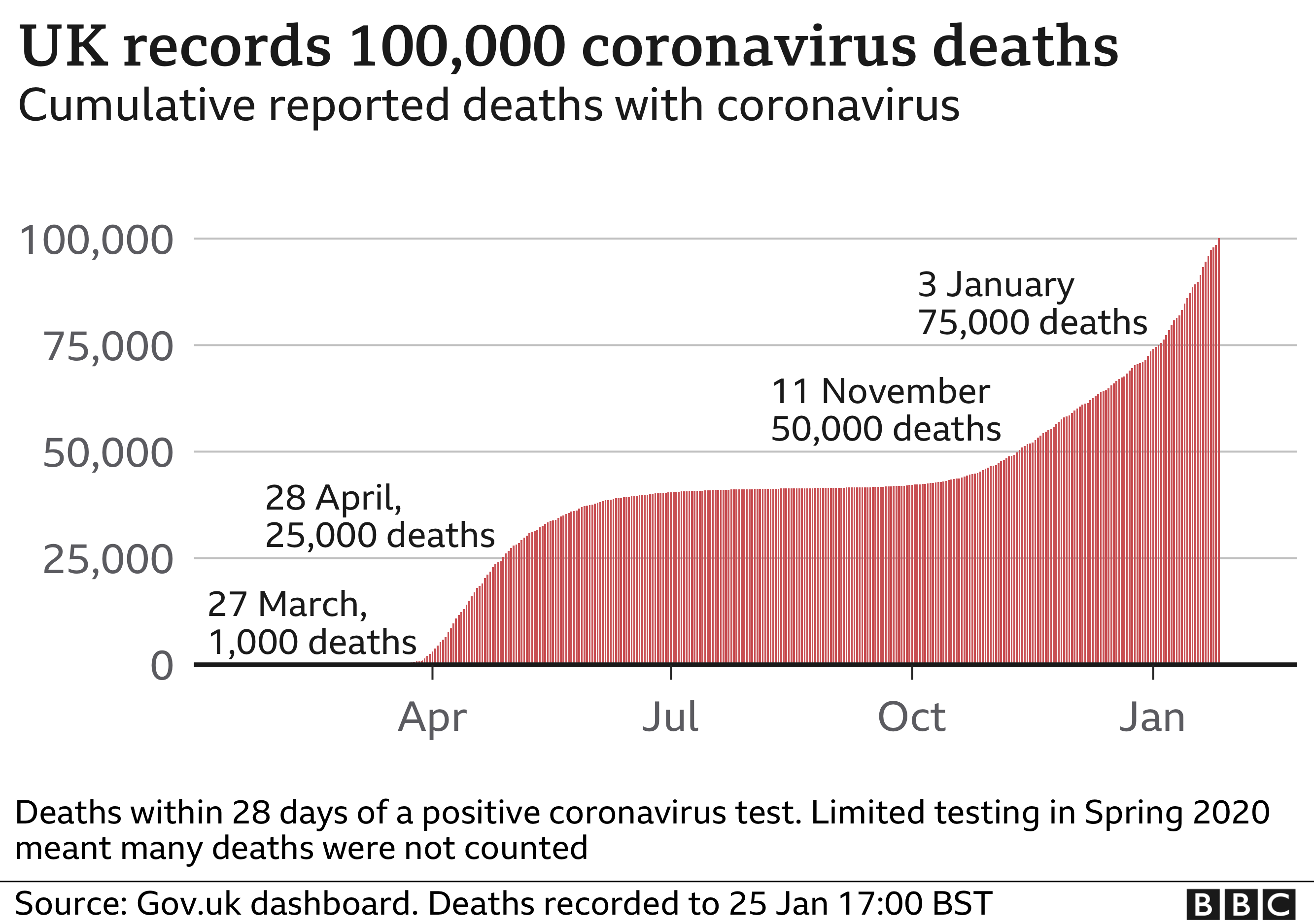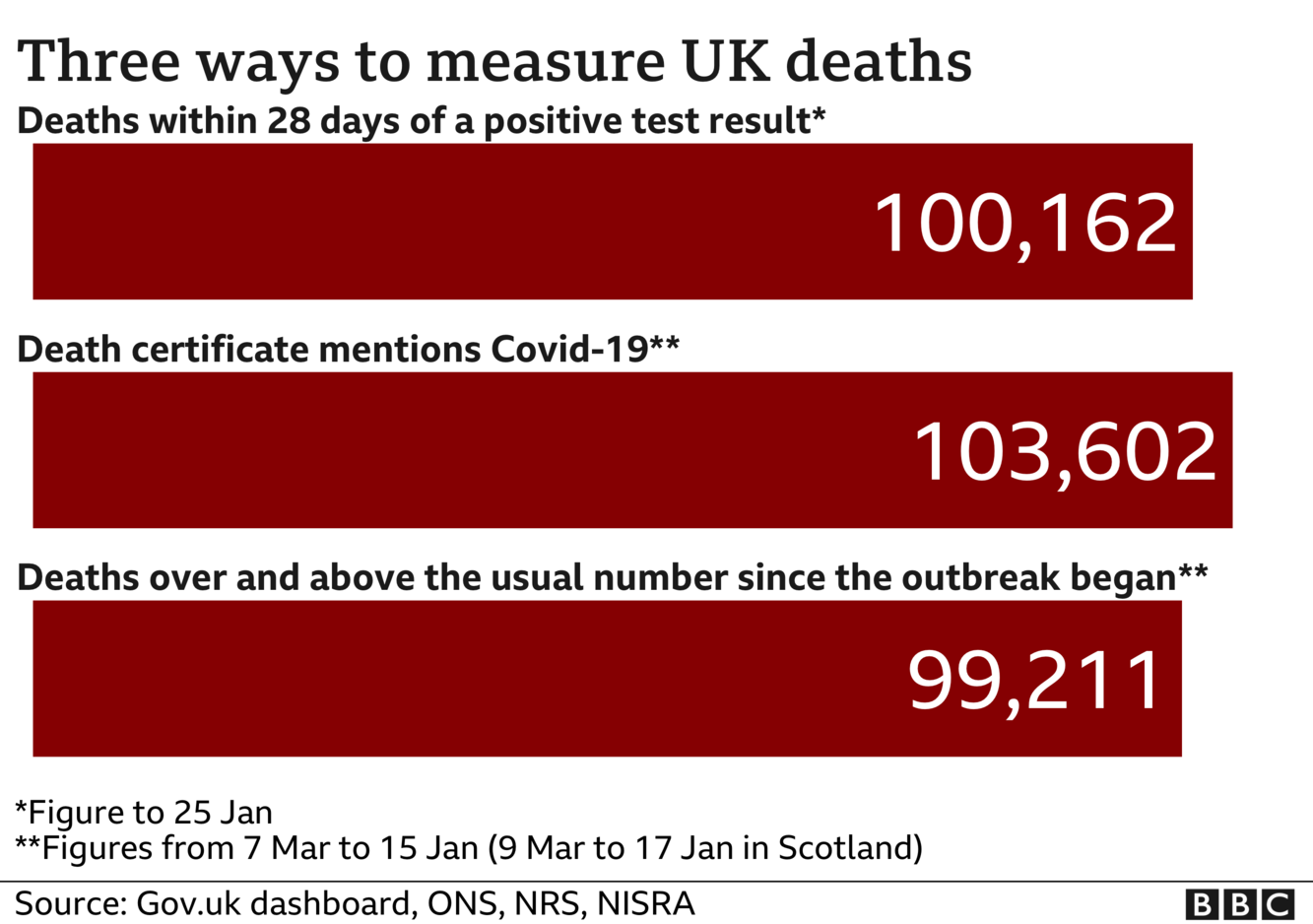Cuomo saying the same thing, his tweet sounded like something Trump would say lol
He sounds compromised. He was one of the very few politicians who was using common sense & being smart during the pandemic.
Cuomo saying the same thing, his tweet sounded like something Trump would say lol
nikkas really losing their minds without access to bars, gyms and clubs, I see.
He sounds compromised. He was one of the very few politicians who was using common sense & being smart during the pandemic.
Weak minded motherfukkas, plain & simple.
Weak minded motherfukkas, plain & simple.










Covid deaths: 'Hard to compute sorrow' of 100,000 milestone - PM
Covid deaths: 'Hard to compute sorrow' of 100,000 milestone - PM
Published
3 hours ago
Related Topics
media captionBoris Johnson announces UK deaths from Covid-19 have passed 100,000
More than 100,000 people have died with Covid-19 in the UK, after 1,631 deaths within 28 days of a positive test were recorded in the daily figures.
Prime Minister Boris Johnson said he took "full responsibility" for the government's actions, saying: "We truly did everything we could."
"I'm deeply sorry for every life lost," he said.
A total of 100,162 deaths have been recorded in the UK, the first European nation to pass the landmark.
Earlier, figures from the ONS, which are based on death certificates, showed there had been nearly 104,000 deaths since the pandemic began.
The government's daily figures rely on positive tests and are slightly lower.
Mr Johnson told Tuesday's Downing Street news conference that it was "hard to compute the sorrow contained in this grim statistic".
- Why is the UK's death toll so bad?
- Kuenssberg: Grim milestone in an abnormal year
- UK deaths likely to come down slowly, Whitty warns
He gave his "deepest condolences" to those who had lost loved ones, including "fathers and mothers, brothers and sisters, sons and daughters, and the many grandparents who've been taken".
The UK is the fifth country to pass 100,000 deaths, coming after the US, Brazil, India and Mexico.
A surge in cases in recent weeks - driven in part by a new, fast-spreading variant of the virus - has left the UK with one of the highest coronavirus death rates globally.
A further 20,089 coronavirus cases were recorded on Tuesday, continuing a downward trend in the number of UK cases seen in recent days. The number of people in hospital remains high, as do the UK's daily death figures.

Mr Johnson said the coronavirus infection rate remained "pretty forbiddingly high" despite lockdown restrictions which have been in place in England since 5 January.
Under the national lockdown, people in England must stay at home and only go out for limited reasons - including for food shopping, exercise, or work if they cannot do so from home. Similar measures are in place across much of Scotland, Wales and Northern Ireland.
Mr Johnson said he would set out more detail in "the next few days and weeks" about "when and how we want to get things open again".


It's a terrible milestone - and one that represents unimaginable loss.
Most of the deaths have come in two waves - the sharp, sudden surge in the spring followed by a slow and sustained rise throughout autumn and winter.
Mistakes have been made - the delay locking down back in March is one that is often cited even by the government's own advisers.
The UK, like much of Europe, was also woefully underprepared with limited testing and contact tracing systems.
But the ageing population, high rates of obesity, the fact the UK is a global hub and its inter-connectedness with Europe are also factors that meant we were tragically never going to escape lightly once the virus got a foothold.

Speaking alongside the prime minister, Prof Chris Whitty, England's chief medical officer, described it as a "very sad day".
He said the number of people dying "will come down relatively slowly over the next two weeks - and will probably remain flat for a while now".
Prof Whitty added the new coronavirus variant had changed the UK's situation "very substantially" with infection rates "just about holding" due to lockdown restrictions.
But he said the number of people testing positive for Covid-19 in the UK "has been coming down" and the number of people in hospital with Covid has "flattened off" - including in London, the South East and East of England.
However, there were "some areas" where the hospital figures were "still not convincingly reducing", he said.
NHS chief executive Sir Simon Stevens said there had been "continuing improvements in hospital treatment for severely sick coronavirus patients".
He said he expected more treatments within the next six to 18 months, adding: "We can see a world in which coronavirus may be more treatable, but for now, it's a combination of reducing infections and getting vaccinations done."


One day there will be a public inquiry - maybe several - seeking to understand why so many died.
Last summer, back when the government was subsidising people to eat out at restaurants, Boris Johnson said there would be an independent inquiry into the government's handling of Covid, but gave no details or dates.
He still hasn't, despite a recent call from bereaved families, trade unions and charities for lessons to be learnt now.
The gravest public health crisis for a century would have tested any government.
But as the pandemic has worsened, the criticisms and questions have mounted - about the timing of lockdowns, the rollout of test and trace and the failure to protect care homes last spring.
There is now pressure on Boris Johnson from some Tory MPs to ease restrictions as soon as the most vulnerable are vaccinated.
But this evening a sombre prime minister said the government would first do everything it could to minimise further loss of life.

Dr Yvonne Doyle, medical director at Public Health England, said it was a "sobering moment in the pandemic", saying: "Each death is a person who was someone's family member and friend."
Labour leader Sir Keir Starmer said it was a "national tragedy" to have reached 100,000 deaths.
The government had been "behind the curve at every stage" of the pandemic and had not learnt lessons over the summer, he added.
The epidemiologist whose modelling in part prompted the UK's first national lockdown said more action in the autumn of last year could have saved lives.
Prof Neil Ferguson told BBC Radio 4's PM programme: "Had we acted both earlier and with greater stringency back in September when we first saw case numbers going up, and had a policy of keeping case numbers at a reasonably low levels, then I think a lot of the deaths we've seen, not all by any means, but a lot of the deaths we've seen in the last four or five months, could have been avoided."

Health Secretary Matt Hancock said the death toll was "heartbreaking" and warned there was a "tough period ahead".
"The vaccine offers the way out, but we cannot let up now," he added.
More than 6.8 million people in the UK have had their first dose of a coronavirus vaccine, according to the latest figures.
so is boris johnson the first world leader to take accountability that it's their fault for this? by being slow as hell to react and having a year and not doing anything
 Yup
Yupmuthafukkas crying like they in a Chinese lockdown
only thing I'll say is the govt should have been distributing monthly checks but I distinctly remember folks in here not even fighting for that but rather to reopen everything...the wealthy really have folks trained well

